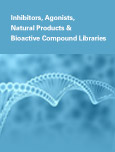| Cat. No. |
Product Name |
Information |
| PC-70116 |
NU-6027
CDK1/2 inhibitor
|
NU-6027 (NU6027) is an ATP-competitive inhibitor of CDK1 and CDK2 with Ki of 2.5 uM and 1.3 uM respectively. |
| PC-70115 |
NU6102
CDK2 inhibitor
|
NU6102 is a potent CDK1 and CDK2 inhibitor with IC50 of 9.5 nM and 5.4 nM against CDK1/cyclinB and CDK2/cyclinA3 respectively. |
| PC-60298 |
MSC2530818
CDK8 inhibitor
|
MSC-2530818 (MSC 2530818, MSC2530818) is a potent, selective, and orally bioavailable CDK8 inhibitor with IC50 of 2.6 nM. |
| PC-60188 |
Olomoucine
CDK inhibitor
|
Olomoucine is a potent, ATP-competetive CDKs inhibitor with IC50 of 7, 7, 7, 3 uM for Cdc2/cyclin B, Cdk2/cyclin A, Cdk2/cyclin E, and Cdk/p35 kinase. |
| PC-42103 |
M2I-1
Mad2 inhibitor
|
M2I-1 is the first small molecule Mad2 inhibitor that targets the binding of Mad2 to Cdc20. |
| PC-45559 |
NU-6300
CDK2 inhibitor
|
NU-6300 is the first covalent, irreversible, ATP-Competitive CDK2 inhibitor with Ki of 6 nM. |
| PC-45599 |
NU-2058
CDK1/2 inhibitor
|
NU-2058 is an ATP-competitive inhibitor of CDK1 and CDK2 with Ki of 5 uM and 12 uM respectively. |
| PC-43435 |
TAME
APC/C inhibitor
|
TAME (Tosyl-L-arginine methyl ester) is a small molecule anaphase-promoting complex/cyclosome (APC/C) inhibitor that binds to the APC preferentially suppresses APC/C(Cdc20) rather than APC/C(Cdh1). |
| PC-44628 |
Senexin A
CDK8/CDK19 inhibitor
|
Senexin A is a selective inhibitor of CDK8 (IC50=0.28 uM) and CDK19, inhibits CDK8 and CDK19 ATP site binding with Kd50 of 0.83 uM and 0.31 uM, respectively. |
| PC-45491 |
SU-9516
CDK2 inhibitor
|
SU-9516 is a potent, selective CDK2 inhibitor with IC50 of 22 nM. |
| PC-46009 |
THZ1 hydrochloride
CDK7 inhibitor
|
THZ1 hydrochloride is a potent, selective, covalent CDK7 inhibitor with IC50 of 3.2 nM. |
| PC-46008 |
THZ1
CDK7 inhibitor
|
THZ1 is a potent, selective, covalent CDK7 inhibitor with IC50 of 3.2 nM, also weakly inhibits CDK12 with IC50 of 250 nM. |













